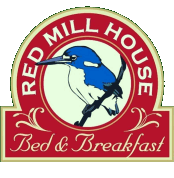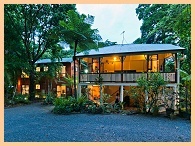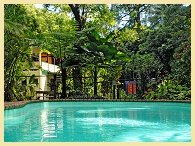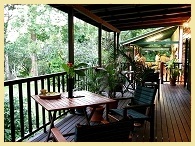
Home
Accommodation
Rates
Packages & Tours
Activities
Suggested Itineraries
River Cruises & Tours
Photo Gallery
Sustainable Tourism
Our Green Policy
Daintree Birdwatching
Daintree Birds
Daintree Birds Checklist
Daintree Birding Bulletin
Weekly Sightings
Daintree Wildlife
Birds
Frogs & Amphibians
Reptiles
Mammals
Butterflies
Travel Hints
Links
Contact Us


|
|
Our Green Policy
Red Mill House has made a strong commitment to environmental best practice and the promotion of environmentally friendly policies. We aim to continually improve and to identify additional opportunities that will assist the business to operate in a more environmentally responsible manner. We also aim to encourage others in the Daintree community to do likewise.
Through a philosophy of 'rethink, reduce, reuse, repair, recycle' we will identify, manage and reduce our environmental footprint by:
- Minimising greenhouse gas emissions by further reducing our consumption of power, water and fuel.
- Reducing waste-to-landfill by improving recycling practices.
- Considering environmental factors in purchasing decisions.
- Working closely with our guests to continually improve our management of environmental issues.
- Regularly monitoring and reporting our environmental performance.
- Incorporating environmental management considerations into our core business plans and management practices.
- Actively promoting and encouraging the adoption of ecologically sustainable work practices and operations within our organisation, and the local business community.
- Making this policy available to prospective clients on the Red Mill House website.
Environmental Best Practice
Red Mill House has adopted the following environmental practices:
- Installation of Energy Efficient Lights. Energy efficient lights have been installed wherever possible. Choosing energy efficient globes generally costs more initially, but they last much longer and use much less power than standard incandescent globes, saving money over time. We are conscious of turning lights off when leaving a room and when closing up at night. Flashlights are provided for guests for night-time use. Timers are used for lighting of paths and stairways.
- Reducing Air-conditioning use. Guests are encouraged to use as little air-conditioning as possible. Ceiling fans and good ventilation are supplied and are sufficient in all but the most hot and humid conditions. Acclimatisation to our local conditions is easier without air-conditioning. Contrary to what some might say, computers do not need to operate in air conditioned environments, and optical equipment is adversely affected by air-conditioning.
- Reduced use of Stand by Power. Stand by power is the power used by appliances when they have been switched off using a remote control or even switched off at the appliance. We are conscious of the impact that stand by power has on significant greenhouse gases and costs, therefore we ensure that computers, printer, stereo, TV, DVD, mobile phone charger and microwave and other electrical appliances are turned off at the power point when not in use.
- Laundry has been contracted out for more energy and water efficient processing. Cold-water washing is used and guests are encouraged to wash only full loads and to line-dry laundry. Use of dryers is discouraged.
- Refrigeration and Freezers are amongst the biggest energy users. We keep our refrigeration in good working order by ensuring seals are clean and in good condition to increase efficiency. Guest's fridges are turned off if not in use for extended periods.
- Paper saving and recycling. Red Mill House has reduced its printing by better use of electronic communication, marketing and record keeping systems. Any printing that is done defaults to double-sided print. It also defaults to grayscale to reduce use of colour toners. We ensure that waste paper is recycled or used as note paper. Additionally we recycle used printer cartridges, and use rechargeable batteries. We also purchase stationary made from recycled products.
- Use environmentally friendly products that are recognised as biodegradable - such as dishwashing detergents, cleaning products, soap powders, rubbish bags etc. Micro-fibre cloths are used to reduce the use of chemicals.
- Reducing use of Transportation. Red Mill House encourages cycling or walking for sightseeing and carpooling by guests for tours etc. We have substantially reduced the use of our vehicle, and all trips are multi-purpose. Guests are advised to hire the smallest and most efficient car to suit their needs. Large 4X4 vehicles are not required.
- Waste management has improved with guests being provided with recycling bins, thus increasing our volume of recyclable and compostable waste and reducing land-fill waste. Guests are advised to not buy water, as our local supply is award-winning, clean water which tastes great.
- Water saving shower heads and dual-flush toilets have been installed and guests are encouraged to reduce their water use.
- Support local Business. Where possible Red Mill House buys locally and uses local produce. We also sell local crafts and books by local authors.
Red Mill House participated in the “Go green - learn, do and save” programme involving small to medium businesses within the North Queensland and Northern Territory regions. Our environmental footprint has been calculated and we are currently working with our environmental consultant to reduce our CO2 emissions.
We have set a target of reducing your energy and waste levels by 10% per year, which we consider achievable.
Red Mill House has also worked with Daintree State School in helping them to calculate their environmental footprint and reduce energy and waste levels.
|
|




